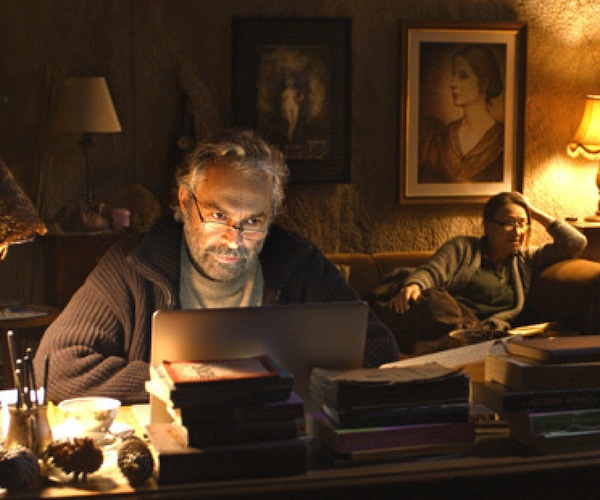Film Review: “Winter Sleep” — Epic Lite
Winter Sleep is not the cinematic masterpiece so many have been hailing it to be.
Winter Sleep, directed by Nuri Bilge Ceylan. Part of the 14th Annual Turkish Film Festival at the Museum of Fine Arts, Boston, through April 5. Winter Sleep will screen on March 26 in the Harry and Mildred Remis Auditorium at the Museum of Fine Arts.

A scene from Nuri Bilge Ceylan’s “Winter Sleep.”
By Paul Dervis
Winter Sleep, filmmaker Nuri Bilge Ceylan’s ode to Anton Chekhov as well as countless other Russian Masters, is an epic tale dedicated to the slo-mo writhing of a superficial man. Winner of the 2014 Palme d’Or for Best Picture at Cannes, the film is haunting and at times visually stunning. But be warned, drink plenty of coffee before you view Winter Sleep. It is three hours and fifteen minutes long and there is a lot of ‘speechifying’ along the way.
Aydin, an aging actor, thinks quite highly of himself. He owns a hotel in Central Anatolia. It is a small place in a ravishing landscape. As winter comes on a sense of claustrophobia rolls in. Aydin is also a bit of a slum lord in the community. But most of all, he is a controlling demigod who believes his opinion is the end-all and be-all to everyone and everything in his sphere of influence.
Aydin is married to Nihal, who is much younger and better looking than he. Predictably, independence is not a trait he encourages in his wife. In fact, there is no one in his world that he dosen’t want to keep wholly dependent; not his wife, recently divorced sister, best friend. Or the townfolk.
Aydin is a bore in all the worst ways.
It is a tribute to Haluk Bilginer, playing Aydin, that the character doesn’t put the audience to sleep. And it is quite a performance. He infuses Aydin with a remarkable disregard for his own shortcomings. He thinks so well of himself that he gets the viewer to almost agree with him…almost. A character that in all rights we should despise, or at the very least mock, comes across as a magnificently flawed Shakespearean character, a sort of pint-sized version of Lear or Richard III… and this is no mean feat.
Reflecting the narrative, the other actors revolve around Bilginer. As Aydin’s wife, Melisa Sozen gives a compelling though subservient performance. Demet Akag, as the somewhat jaded sister, rounds out the formidable cast. The flim’s flaws cannot be attributed to the actors…or cinematography. No, it is in the script itself. The film is adapted from Chekhov’s short story “The Wife” as well as some of the writer’s theatrical works. There is nothing inherently wrong with that — literature has inspired many great films. But the page and stage must to be converted to serving the aesthetics of celluloid. The middle third of Winter Sleep could much more effectively work as either a live performance or an exchange of dialogue in a short story. Essentially, two dialogue driven scenes take up sixty minutes of the film, challenging the viewer not to become impatient. This hour demands editing and dramatic shaping.
There are many strikingly memorable images in Winter Sleep. A stone thrown by a young boy. A broken windshield. A gift, rejected as if it were an insult. And how the stultifying atmosphere is ironically undercut to the point of revelation: the meanness of petty tyranny is juxtaposed with the country’s vast grandeur. It is as if all the possibilities of the world were within reach of these characters, but no one bothers to make an effort. In this respect, the film is an impressive accomplishment.
But is it the masterpiece so many have been hailing it to be? Is it the peak of an important director’s career? Ceylan, whose other significant works include Once Upon a Time in Anatolia, Distant, and Three Monkeys, is considered by critics to be one of the masters of Turkish cinema. And the Palme d’Or is certainly a substantial addition to his trophy collection. However, the film left me with an ‘Emperor’s New Clothes’ impression. The steamrollering praise becomes a means of intimidation: one fears that pointing out the film’s problems is somehow doing a disservice to a Turkish director who dares to criticize his autocratic country. It is as if we ‘need’ to think that this is a great film.
I do not.
Winter Sleep is splendidly acted and a well-crafted vision of beauty. But a work of art should not leave you feeling undernourished, hungry for more. Nuri Bilge Ceylan’s too much leaves us with too little.
Paul Dervis has been teaching drama in Canada at Algonquin College as well as the theatre conservatory Ottawa School of Speech & Drama for the past 15 years. Previously he ran theatre companies in Boston, New York, and Montreal. He has directed over 150 stage productions, receiving two dozen awards for his work. Paul has also directed six films, the most recent being 2011’s The Righteous Tithe.
Tagged: 14th Annual Turkish Film Festival, Anton Chekhov, Best Picture, Cannes, Nuri Bilge Ceylan, Palme d'Or, Paul Dervis, Turkish Film Festival
